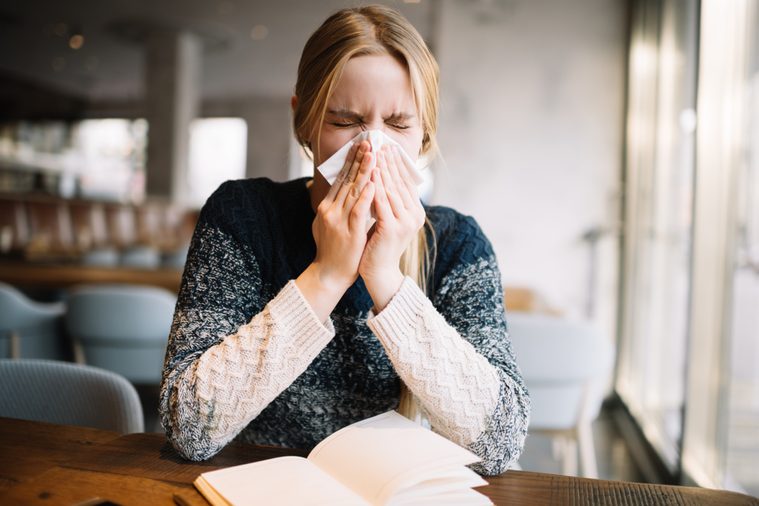
The 2017-2018 flu season was one of the worst on record
Based on the CDC surveillance during the 2017-2018 season, experts estimate that influenza caused more than 48.8 million illnesses, 22.7 million medical visits, 959,000 hospitalizations, and 79,400 deaths. “This burden was higher than any season since the 2009 pandemic and serves as a reminder of how severe seasonal influenza can be,” says Lavdena Orr, MD, pediatrician and market chief medical officer for AmeriHealth Caritas District of Columbia.
This year, there are several types of flu shots, and choosing the right one can depend on your age. For people with weaker immune systems—like those 65 and older—getting a high-dose shot or one with an immune-boosting ingredient called an adjuvant is wise. People and children between the ages of 6 and 64 can look for the quadrivalent shot—it protects against four types of virus. But if it isn’t readily available, experts advise going with the trivalent—three-viruse—shot, which is the standard. There’s also a nasal spray for people who don’t like needles, reports the New York Times. Find out the 13 worst places in America for flu this year.

Anyone can get the flu
The flu doesn’t discriminate between healthy and unhealthy people, and complications from the flu can occur at any age. However, older adults, younger children, pregnant women, and individuals with certain chronic medical conditions are at an increased risk of developing serious flu-related complications. That’s why the CDC recommends a yearly flu vaccine for everyone six months or older to help protect against infection and reduce the severity of symptoms. Check out 8 things that make your flu vaccine less effective.

The virus spreads easily
Flu is a contagious respiratory illness caused by influenza viruses. According to Dena Nader, MD, regional medical director of MedExpress Urgent Care, the viruses spread through the air in droplets when somebody infected coughs, sneezes, or even talks. These viruses can travel as far as six feet away, so you can be infected by somebody who isn’t even standing next to you.

Healthy individuals can infect others
“It’s easy to pass on the flu to others, even when you don’t present with symptoms right away,” says Adrian Cotton, MD, chief of medical operations at Loma Linda University Health. According to the CDC, otherwise-healthy adults can start infecting others one day before symptoms develop. After becoming sick, individuals with the flu are most contagious during the first three to four days and can infect others up to seven days later.

Babies are particularly vulnerable
Complications from the flu can be devastating for infants younger than six months, who aren’t old enough to be vaccinated. However, according to Dr. Orr, a flu vaccine given during pregnancy not only helps to protect the mother but also helps protect the baby from flu infection for several months after birth. “Flu shots have been given to millions of pregnant women over many years with a good safety record,” she says. “Preventing flu in pregnant women will help them to have healthy babies.” Find out everything you need to know about flu in children.

Flu can be deadly
While certain flu complications, like sinus and ear infections, are only moderately bothersome, influenza virus can also cause life-threatening complications, the most common being bacterial pneumonia. A bacterial infection of the lungs can happen because “the flu virus injures the lungs and causes inflammation that then makes it easier for bacteria to invade the lungs,” Claire Bocchini, MD, an infectious-disease specialist at Texas Children’s Hospital, told CBS News. Pneumonia can be deadly when it becomes hard to breathe and your lungs can’t get enough oxygen for your body, she added. Read up on the 20 things you need to know about the flu virus.

Heart attacks are more likely
Molecular cardiologist Glen Pyle, MD, in an article for health-care software company LifeOmic, referenced a University of Toronto study that found a 600 percent increased risk of a heart attack during the first week after being infected with influenza. While there’s no clear explanation yet for the link between flu and heart attacks, Dr. Pyle has an idea, writing, “Infections can stress the body including blood vessels. This can cause damage and blood clots may form or plaques in the arteries may break away. Clots and plaques get stuck in small blood vessels and when those vessels are in the heart…well, that is a heart attack.”

Bed rest might cause pneumonia
When you have the flu, all you want to do is lie down. Unfortunately, lying flat collapses the lungs, making it harder to cough efficiently. When that happens, bacteria get trapped in your respiratory tract, where they can sneak into your lungs. A bacterial infection in your lungs can lead to pneumonia, which, as we already know, can be deadly. Learn more about surprising things you shouldn’t do when you have the flu.

Medication may not always be beneficial
Flu symptoms aren’t any fun, but don’t suppress the achoos and hacking too much: Sneezing and coughing are two ways your body tries to clear out the virus. “Certainly, there is the thought that you don’t want to suppress a cough too much or dry out your nasal passages because you want to get rid of the infection,” Tara Vijayan, MD, told the New York Times. The assistant clinical professor in the Division of Infectious Diseases at the University of California, Los Angeles, David Geffen School of Medicine also noted, “There’s a balance for sure. I don’t think you should suffer unnecessarily, but you need to weigh the true benefit.” Read about the best foods to eat when you have the flu.

Flu can become resistant to drugs
The FDA recently approved Xofluza, the first new antiviral flu treatment in nearly 20 years. “Having more treatment options that work in different ways to attack the virus is important because flu viruses can become resistant to antiviral drugs,” Debra Birnkrant, MD, director of the Division of Antiviral Products in the U.S. Food and Drug and Drug Administration’s Center for Drug Evaluation and Research, said in a news release. “When treatment is started within 48 hours of becoming sick with flu symptoms, antiviral drugs can lessen symptoms and shorten the time patients feel sick.” Now check out these 15 surprising tips to help prevent colds and flu.